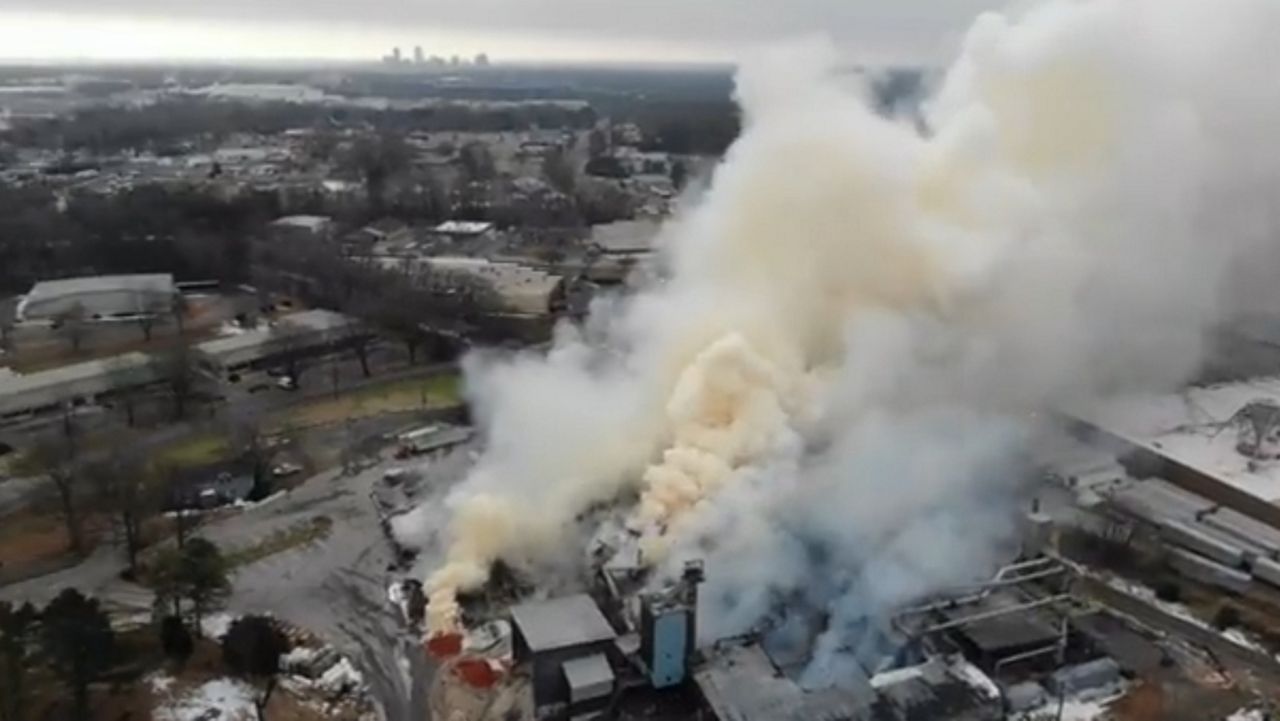WINSTON-SALEM, N.C. — The massive blaze at a fertilizer plant in Winston-Salem burned out of control for days. The fire forced thousands near the plant to evacuate homes and businesses, with the city warning that ammonium nitrate at the plant could cause a large explosion.
A class-action lawsuit filed in Forsyth County Thursday accuses the Winston Weaver Fertilizer Co. of gross negligence. The company had 600 tons of ammonium nitrate at the plant and had a duty to neighbors to keep it safe, the lawsuit said.
“The Weaver Fertilizer plant fire terrified and displaced a community. These folks, as well as the businesses in the affected area, deserve justice,” attorney Gary Jackson said in a statement. “This company needs to accept responsibility for the harms it has visited upon its unsuspecting neighbors.”
The lawsuit states Winston Weaver Co. Inc., which owns the fertilizer plant in Winston-Salem, “knew, or should have known, that storing 600 tons of highly explosive chemicals was inherently dangerous.”
Karen Prudencio is the lead plaintiff in the lawsuit against Winston Weaver Co. Inc.
Pudencio lived near the plant. She had to evacuate her home on Feb. 1, the day after the fire started, according to the lawsuit. She first stayed with a relative but then tested positive for COVID-19 on Feb. 2, court records say.
She had to stay at home while the evacuation was in effect, according to the lawsuit.
Lawyers on the lawsuit, Jackson and Thomas Wilmoth with the Law Offices of James Scott Farrin, are asking the lawsuit be certified as a class action.
If a judge approves of the class action, that means the lawsuit could be used to represent anyone who had to evacuate or missed work because of the fire.
“They had to leave their homes for days and find alternative housing; they closed their businesses and lost income; they will have to ensure their properties are free of dangerous chemicals; some have experienced adverse health effects and many fear how the blast may affect their future health,” Jackson said.
The fire began before 7 p.m. on Jan. 31. Firefighters began battling the blaze that Monday night until they realized they were dealing with hundreds of tons of potentially explosive chemicals. Winston-Salem Fire Chief Trey Mayo ordered his crews to pull back from the scene and called for people within a mile of the plant to evacuate.
“The evacuation forced about 6,500 people, including women and children, in 2,500 homes to evacuate in the middle of the night,” the lawsuit states. “The evacuation forced residents out of their homes and closed local businesses for over 96 hours.”
There was enough ammonium nitrate at the fertilizer plants to cause a massive explosion.
The fire chief compared it to a similar 2013 fertilizer plant fire in West Texas that involved 270 tons of ammonium nitrate. That explosion flattened nearby buildings, killing 15 and injuring more than 250.
The evacuation started at 3 a.m. on Feb. 1, according to the lawsuit, forcing many from their homes without toiletries and changes of clothes.
“Unable to return home, the evacuees were forced to pay for hotel rooms, stay with friends or family, or go to shelters,” the lawsuit states.
At least one other lawsuit has been filed in Forsyth County over the fire and evacuation.
Lawyers for the latest lawsuit say firefighters had been called to the factory four times before the Jan. 31 fire. They also say the company did not submit required forms for storing dangerous chemicals on the site.
“The Winston-Salem Fire Department, despite doing an outstanding job of protecting the citizens of Winston-Salem, were hindered in their response because of Defendant’s failure to inform them of the nature and quantities of hazardous chemicals stored at the plant,” the lawsuit states.
Spectrum News 1 reached out to Winston Weaver Co. for comment, but has not heard back.



